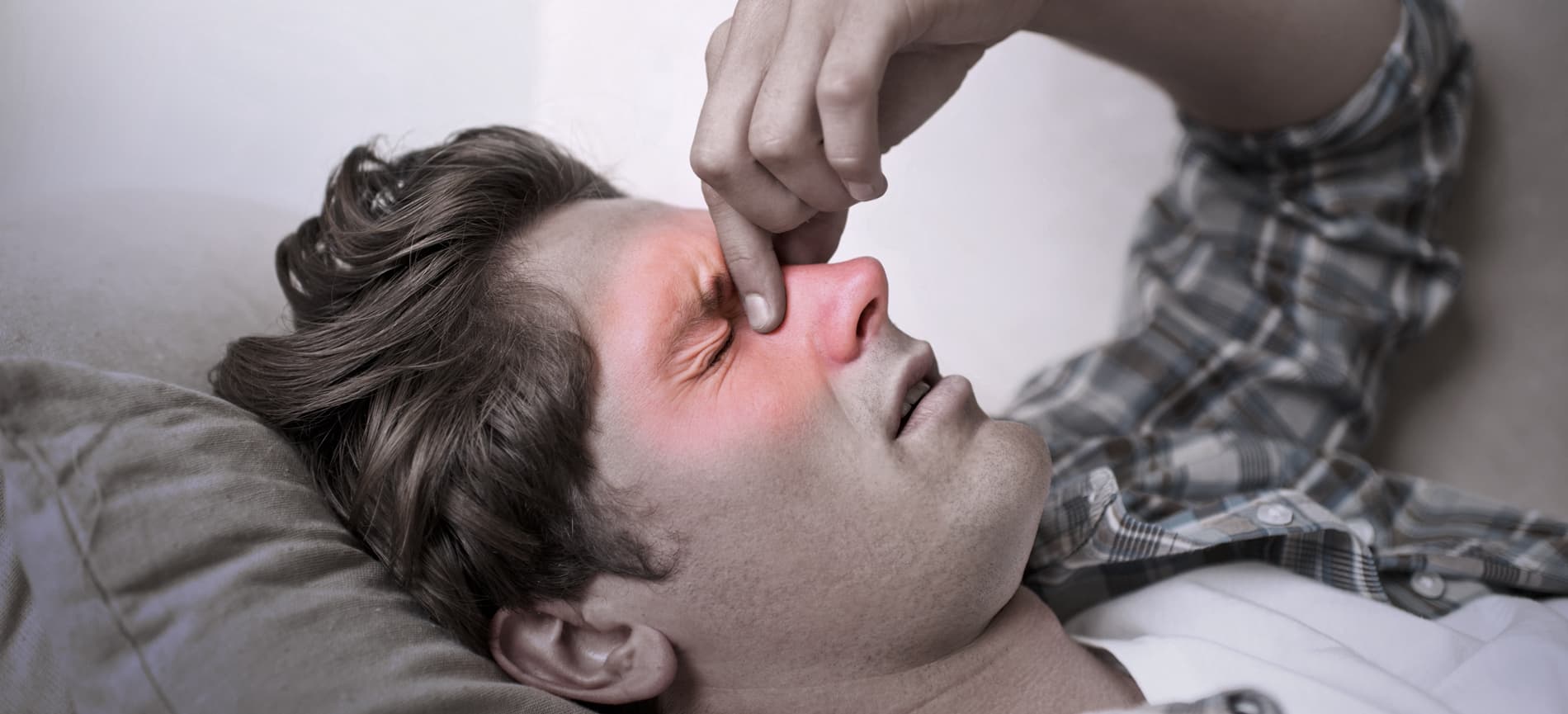Sinus Headache / Sinus Infection
What you should know

Sinus Headaches
Symptoms and Causes
Sinus headaches are often misunderstood and can cause discomfort when the sinus cavities in your head become inflamed or congested. This condition may result from sinus infections, allergies, or other medical issues, leading to pressure and pain in the face and head.
Common Symptoms
Sinus headaches typically present with symptoms that resemble other conditions, making them challenging to diagnose accurately. Common signs include:
- Pain and Pressure: A feeling of fullness or pressure around your cheeks, eyes, or forehead.
- Congestion: Nasal passages may feel blocked, making breathing through your nose difficult.
- Discharge: A thick, yellow, or green nasal discharge may accompany these symptoms.
- Worsening Pain: Symptoms may intensify when bending over, lying down, or after waking up.
- Other Symptoms: Fatigue, a reduced sense of smell or taste, and general malaise may also occur.
Causes
Sinus headaches are usually the result of inflammation or blockage in the sinus cavities. Several factors can contribute, including:
- Sinus Infections: Viral, bacterial, or fungal infections can cause sinus inflammation and swelling.
- Allergies: Conditions such as hay fever can trigger sinus inflammation, leading to headaches.
- Structural Issues: Nasal polyps or a deviated septum can block normal sinus drainage, creating pressure.
- Weather Changes: Rapid changes in temperature or humidity may also exacerbate symptoms.
When to Seek Medical Attention
It's essential to consult a healthcare professional if:
- Your symptoms persist for more than 10 days or worsen over time.
- You experience high fever, swelling around the eyes, or severe pain.
- Home remedies or over-the-counter treatments don't alleviate your discomfort.
Treatment Options
Effective management depends on identifying the underlying cause of your sinus headache. Potential treatments include:
- Medications: Decongestants, antihistamines, or nasal corticosteroids may help relieve symptoms.
- Antibiotics: These are only prescribed if a bacterial infection is diagnosed.
- Home Remedies: Staying hydrated, using a humidifier, or trying saline nasal sprays can help ease symptoms.
- Surgical Intervention: In rare cases, surgery may be needed to address structural issues affecting sinus drainage.
Preventing Sinus Headaches
To minimize your chances of experiencing sinus headaches:
- Manage allergies with appropriate medications or avoidance strategies.
- Practice good hygiene to reduce the risk of infections.
- Use a humidifier during dry seasons to keep your nasal passages moist.
- Avoid known triggers, such as smoke or strong odors.
Sinus Infections (Sinusitis)
Symptoms, Causes, and Treatment
A sinus infection, also known as sinusitis, occurs when the tissue lining the sinuses becomes inflamed or swollen. This can result from a variety of causes, including infections, allergies, or environmental irritants. Sinusitis can be acute, lasting a few days to weeks, or chronic, persisting for several months.
Symptoms of Sinus Infections
Sinus infections can cause a wide range of symptoms, depending on the severity and underlying cause. Common symptoms include:
- Nasal Congestion: Difficulty breathing through the nose due to blockage.
- Facial Pain or Pressure: Discomfort around the cheeks, eyes, forehead, or bridge of the nose.
- Nasal Discharge: Thick, yellow, or green mucus from the nose or down the back of the throat (postnasal drip).
- Headache: Pain that intensifies with head movement or bending forward.
- Fever: May occur with bacterial infections.
- Reduced Sense of Smell or Taste: Difficulty detecting scents or enjoying flavors.
- Cough and Sore Throat: Often caused by postnasal drip.
- Fatigue: General tiredness or malaise.
Causes of Sinus Infections
Sinus infections result from various factors that lead to sinus inflammation or block normal drainage. Common causes include:
- Viral Infections: The most common cause, often associated with colds.
- Bacterial Infections: These may develop if a viral infection persists and worsens.
- Allergies: Conditions like hay fever can trigger sinus inflammation.
- Environmental Irritants: Pollutants, smoke, or strong odors may inflame the sinuses.
- Structural Issues: A deviated septum, nasal polyps, or other anatomical abnormalities can block sinus drainage.
Types of Sinus Infections
There are different classifications for sinus infections:
- Acute Sinusitis: Lasts less than four weeks. Symptoms often follow a cold or upper respiratory infection.
- Chronic Sinusitis: Lasts longer than 12 weeks. May involve ongoing inflammation and recurring symptoms.
- Recurrent Sinusitis: Multiple episodes of acute sinusitis within a year.
When to Seek Medical Care
It's essential to consult a healthcare provider if:
- Symptoms persist beyond 10 days or worsen after initially improving.
- You experience high fever, swelling around the eyes, or severe pain.
- Symptoms recur frequently, suggesting chronic or recurrent sinusitis.
Treatment Options for Sinus Infections
Treatment depends on the cause and severity of the sinus infection. Common approaches include:
- Medications:
- Decongestants: Help reduce swelling and open nasal passages.
- Nasal Corticosteroids: Relieve inflammation in the sinuses.
- Antibiotics: Prescribed for bacterial sinusitis only.
- Home Remedies:
- Use a saline nasal spray or rinse to clear nasal passages.
- Stay hydrated to thin mucus.
- Apply warm compresses to relieve facial pain.
- Surgery:
- In chronic or severe cases, surgical procedures like sinus drainage or correction of structural abnormalities may be necessary.
Prevention Tips
Preventing sinus infections involves maintaining good sinus health and avoiding known triggers:
- Manage Allergies: Use antihistamines or allergy medications as needed.
- Stay Hydrated: Keep nasal passages moist.
- Practice Hygiene: Wash hands frequently to reduce the risk of infection.
- Avoid Irritants: Stay away from cigarette smoke and air pollutants.
- Use a Humidifier: Keep indoor air moist during dry seasons.
Take Control of Your Sinus Health
Sinus infections can be uncomfortable, but they are often manageable with the right care. By understanding the symptoms, causes, and treatment options, you can take proactive steps to find relief and prevent future issues. If your symptoms persist or worsen, consult a healthcare provider for personalized advice.
How can you get help without
going to a doctor's office?
Urgentcare.com offers fast, 24/7/365 provider communication. If you're having severe symptoms or need relief fast, talk to a board-certified provider who can send a prescription to the pharmacy of your choice. Your Urgentcare.com provider can also help determine if something else is causing your concerns.



